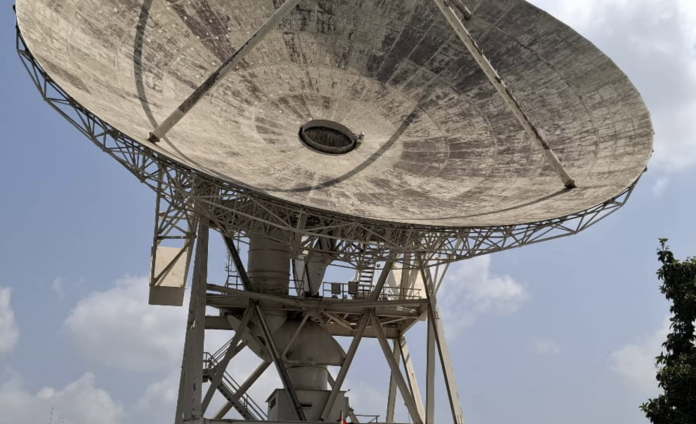The Ghana Atomic Energy Commission (GAEC) has expressed concerns over the illegal acquisition of lands surrounding the Ghana Radio Astronomy Observatory (GRAO) at Kuntunse, Ga West Municipality, Greater Accra Region.
The land, acquired over 40 years ago to support satellite observation, data collection, research, and training in Space Sciences, has been taken over by private developers, which is now impacting the efficiency of the facility.
Addressing a news conference following a tour of the Observatory on Tuesday, the management of the GRAO raised alarm over ongoing construction near the facility, warning that the observatory could become “useless” if those activities continued.
The management explained that settlements and household devices, such as microwaves, were interfering with radio signals, hampering satellite observations beyond 10 minutes.
Launched in 2017, GRAO plays a crucial role in global space science, offering a platform for scientists to study the universe.
It supports Ghana’s participation in space research, fostering the development of scientists and engineers.
Ghana’s National Space Science Policy, launched in 2024, aims to leverage space technology for national development, security, and sustainability.
During a visit to the Observatory on Tuesday afternoon, the Ghana News Agency observed that numerous buildings had been constructed around the facility, with some located as close as 50 meters from the satellite dish.
Military officers were stationed at the site, providing security while contractors worked diligently to construct a fence around the remaining buffer zones of the facility.
Obrempong Toku Dum (VIII), Project Manager of the Via Sat Station (Real Time Earth Station), revealed that in 1979, an Executive Instrument facilitated the procurement of 163 hectares of land for the Radio Astronomy Observatory.
However, he noted that the land had been reduced to about 30 hectares over the past four decades, which now threatened the future viability of the facility.
“We want to create awareness about the importance of this facility. Ghana’s closeness to the equator presents an opportunity for us to attract investment into this facility,” Obrempong Dum VIII said.
Dr Joseph Bremang Tandoh, Director, Ghana Space Science Technology Institute, said the Radio Astronomy Observatory was a vital national asset crucial for the successful implementation of Ghana’s Space Science Policy.
He appealed to authorities and the public to support efforts to protect the facility from further encroachment and safeguard the investments channelled into it.
“Through this facility, a lot of Ghanaians have been trained in data science and other professions, and this inspires the next generation to pursue science. We have to protect it,” he said.
Latest Stories
-
Gov’t begins payment of monthly allowances to Assembly Members
2 minutes -
Cedi must lead Ghana’s economy – BoG to clamp down on dollar transactions
7 minutes -
Ghana Anti-Corruption Coalition urges youth to take lead in combating corruption
15 minutes -
Village Savings and Loan Groups in Wassa Amenfi West receive financial literacy training
17 minutes -
When the Elephant Lost its Trunk: A Post-Election Safari in the Republic of Uncommon Sense
25 minutes -
Education Ministry secures additional $117.1m to expand GALOP interventions
27 minutes -
Government of Ghana endorses Trans-African Tourism and Unity Campaign
29 minutes -
WAFCON 2024: Chantelle Boye-Hlorkah credits team unity for Black Queens’ quarter-final berth
35 minutes -
A Giant Leap for African Unity: Kenya’s historic Visa-Free policy and the Trans African tourism and unity campaign
40 minutes -
Holuta Aflakpe DA JHS wins 10th edition of Ho West District Quiz Competition
41 minutes -
Daniel Ayittah becomes first Ghanaian gospel engineer to join GRAMMY Academy
49 minutes -
GES to scale up transformative Kindergarten programme nationwide
50 minutes -
BoG to mark 60 years of the Cedi with anniversary celebration in August
50 minutes -
Prison Service to produce furniture, uniform for schools – Interior Minister
54 minutes -
Ras Mubarak leads 38-country Trans Africa Unity drive, begins August 18
55 minutes

